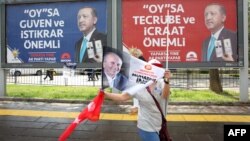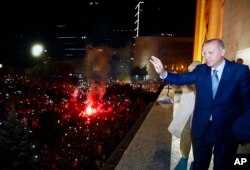An election observation mission found Monday that though voters had a genuine presidential election in Turkey, which incumbent Recep Tayyip Erdogan decisively won, the conditions for campaigning were not equal.
The Organization for Security and Cooperation in Europe (OSCE) said in a preliminary statement Monday the incumbent enjoyed "undue advantage, including in excessive coverage by government-affiliated public and private media outlets.”
In a joint statement released later, EU diplomatic chief Federica Mogherini and enlargement commissioner Johannes Hahn cited the results of the mission, refusing to congratulate Turkey's president, not even mentioning him by name.
"The elections trigger the entry into force of the new presidential system which has far reaching implications for Turkish democracy - as raised by the Venice Commission - regarding checks and balances," the statement read.
"In general, Turkey would benefit from urgently addressing key shortcomings regarding the rule of law and fundamental rights."
While the U.S. State Department did not join the critical view, in a statement released Monday, it encouraged "all of Turkey's representatives, including President Erdogan, to represent the diverse views of all of Turkey's citizens and to strengthen Turkey's democracy."
The European Union has been highly critical of Turkey's arrest of tens of thousands of people, many of them members of the media, under a state of emergency following a failed coup launched against Erdogan in 2016.
Showered with media accolades
Erdogan secured his hold on power Sunday, winning more than 52 percent of the votes and avoiding a run-off in what was seen as one of the most contested Turkish elections in recent years.
“Superdogan,” is the headline of pro-president Takvim newspaper Monday, “Prayer, Effort, Glory” declared the Islamic daily Akit. Similar headlines echoed across nearly all the media, most of which are under direct or indirect control of Erdogan and his supporters.
“We have received the message that has been given to us in the ballot boxes," Erdogan said to thousands of supporters at his AKP Party headquarters in Ankara in a pre-dawn appearance Monday. “We will fight even more with the strength you provided us with this election,” Erdogan said.
Erdogan supporters celebrated in towns and cities across the country. In Taksim Square in the heart of Istanbul, Turkey’s largest city, people danced and chanted slogans.
The opposition initially contested the outcome Sunday, claiming the result was announced before all the votes had been counted. Opponents posted photos of sacks containing what they claimed were uncounted ballots on social media.
Erdogan's main challenger, Muharrem Ince sent a message via “WhatsApp” to a Turkish television news anchor acknowledging Erdogan’s victory, but also claiming the election was unfair.
Ince scored nearly 31 percent of the vote in a hotly contested campaign, with his political rallies drawing millions. Before the polls, the opposition had voiced fears of vote rigging.
Sweeping powers
Erdogan now assumes the sweeping new powers passed in last year’s constitutional referendum, which was marred by fraud allegations.
Under those changes, the 64-year-old leader now has the power to rule by decree, along with greater control over appointments of top judges and a parliament whose role is greatly diminished following the abolition of the position of prime minister. Erdogan will now appoint ministers who will directly report to him.
Erdogan’s main challengers had warned during their campaigns the new presidential powers were tantamount to an elected dictatorship, a charge dismissed by the president.
The president’s grip on power was strengthened further in simultaneous parliamentary elections. Erdogan’s AKP Party is set to continue to control parliament, although it will need the support of the nationalist MHP Party, with which it formed an electoral alliance. The two parties have been closely cooperating in parliament since 2016.
The pro-Kurdish HDP Party accused by Erdogan of being terrorists, also entered parliament. HDP supporters danced and held celebrations in main towns and cities across Turkey’s predominantly Kurdish southeast.
Sunday’s comprehensive victory came as most opinion polls suggested many in Turkey believe the contest was closer than reported.
But observers say Erdogan, with his new presidential powers and a new electoral mandate, appears to have emerged more powerful than ever.








